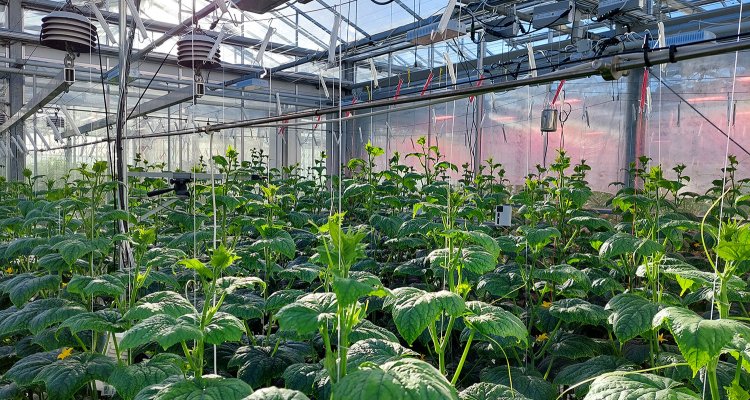
News
Profitable cultivation possible with AI
Artificial intelligence can approach flesh-and-blood cultivation experts and grow a strong crop. This is evident from the first phase of the AGROS project: working towards autonomous greenhouses. For a number of months, algorithms controlled the climate in a greenhouse with cucumbers. Researcher Guido Jansen from the Business Unit Greenhouse Horticulture of Wageningen University & Research: “The algorithm has been trained with more than 2 million simulations.”
The algorithm was trained using simulations based on crop and greenhouse climate models. These models are made with data from real past crops, but can generate an enormous amount of synthetic data about cucumber cultivation. Training is done through reinforcement learning (using neural networks). The algorithm was fed millions of times with information about the greenhouse climate and the state of the crop. The algorithm then made one or more decisions about the climate (for example: a higher temperature or the lighting on or off). The consequences of these decisions on, for example, the number of fruits were calculated using crop models and greenhouse climate models.
As a result, the algorithm learned the consequences of the measures taken. Jansen: “In the beginning, an algorithm is a blank slate. That sometimes led to strange choices. But gradually the decisions got better and better. So it is a matter of learning and unlearning. In that respect, reinforcement learning is comparable to the human brain.”
Next was the practical test. Cucumbers were grown for 4 months in the greenhouses of WUR research location in Bleiswijk. Artificial intelligence was applied in one greenhouse, in another greenhouse digital twins were used (i.e. a digital copy of a crop) and there was a greenhouse where cultivation was arranged based on a cultivation plan by a group of cultivation experts. This showed that artificial intelligence is capable of achieving a strong crop and profitable cultivation.
Jansen: “Autonomous cultivation is getting closer. But autonomous cultivation only knows how to deal with known situations. The question is: what does the system do when something unexpected happens? In situations like that, a grower is still needed to make the right decisions.”
The AGROS project has now been completed. The follow-up has now started, AGROS II, in which the next steps towards an autonomous greenhouse are being worked on. Here, artificial intelligence is expanded to include irrigation and the crop.
The AGROS project: towards an autonomous greenhouse is a public-private partnership project in which the Greenhouse Horticulture and Flower Bulbs Business Unit of Wageningen University & Research collaborates with 2Grow, BASF Vegetable Seeds, Delphy, Gennovation, Greenport West-Holland, Hortilux, IMEC/One Planet, Mechatronix, Philips, Ridder, Roullier, Saint-Gobain Cultilene, Signify, Stichting Kennis in je Kas and Van der Hoeven, with financing from the government program Topsector Tuinbouw & Uitgangsmaterialen.